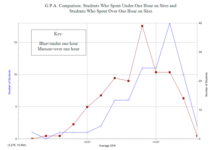The Entertainment Software Association (ESA) stated that the US entertainment software industry jumped from $2.6 billion in revenue in 1996 to $14.8 billion in 2012, implying more people are playing more video games. But some experts worry that some of these games could have negative effects. A study published in 2012 found a link between violent games and aggression. Brad Bushman, a professor of psychology at Ohio State University and co-author of the study, found that young gamers exposed to violent video games over only three days of consecutive gaming were more hostile. 
According to the ESA [PDF], in 2013, 58% of Americans play video games; of those people, 32% are 18 years or younger, 32% are ages 18-35 and 36% are 36 and older.
A study done in 2010 by Mirjana Bajovic, for her PhD dissertation in educational studies at Brock University in Canada, also raises concern as to how long hours of gaming can affect the teenage psych. The study included 100 13- to 14-year-old teenagers who frequently played violent video games. The researchers found that these kids lose their sense between what is morally correct and incorrect. The study also found that these kids showed a lack of empathy and suppressed emotions for others based on the Sociomoral Reflection Measure, a test given to measure empathy and relationships with other people.
In the same study, 44% of boys were found to play violent games, whereas only 17% of girls in the same age group played or had any knowledge of these video games.
“Games that have a real storyline or characters with unique identities appeal more to female players whereas games that have a certain level of action, maybe even some level of aggression or violence, tend to appeal to a teenage boy” said John Gallagher, a psychologist at the Denver School of Science and Technology (DSST).
Jackson Dean, a 17-year-old student at the DSST and a regular gamer, noticed the same emotions and immersion when playing video games. “I’m not really thinking about how I feel when I play video games late at night. I’m in the moment playing the video game and taken away from my surroundings”
The violence enticed by video games in adolescents can cause problems later down the road when it comes to careers, according to Gallagher. “I think the concern that people put out there, that video games substitute quality social interactions, is the idea that the video gamers growing up through adolescence are sitting in isolation not getting that social interaction that really develops skills for the workforce”
“Sometimes I may do [homework] faster and not to my fullest ability when I want to play video games,” said Dean.
Habits formed from playing video games at an early age may have an effect in the future when the current generation of students becomes a part of the workforce, said Gallagher.
A 2011 study on young men by Yang Wang, an associate professor in Indiana University’s Department of Radiology, showed that frequent exposure to video games can reduce the functioning of certain parts of the brain. Of the 28 men who were part of the test, all members of the experimental group showed reduced activity in the left frontal lobe, which is directly related to cognitive flexibility and attention. Sumeet Batra

This work is licensed under a Creative Commons Attribution-NonCommercial-NoDerivs 3.0 Unported License















